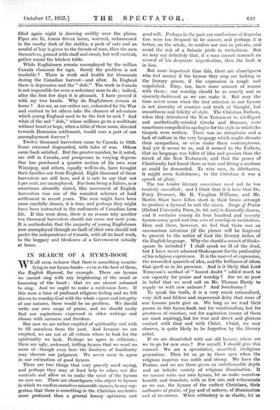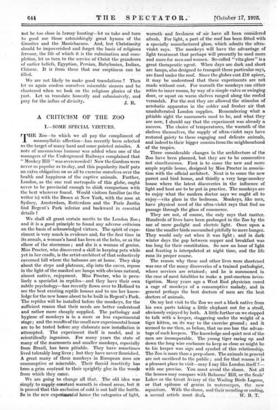IN SEARCH OF A .HYMN-BOOK .
E all seem to know that there is something unsatis- fying in our hymn-books—even in the best of them, the English Hymnal, for example. There are hymns we cannot sing with any heightening of the mind or -loosening of the heart ; that we -are almost 'ashamed to sing., - And we ought to make a confession 'here. If this were a time of profound religious 'feeling and we felt driven to worship God with the whole vigour and integrity of our natures, there would be no problem. 'We should write our own songs of praise, and we should easily find our - aspirations expressed in older writings and choose with sureness and freedom: But now we are rather emptied of spirituality and wish to fill ourselves from the past. And because we are emptied, we are not at all certain where to look for the spirituality we lack. Perhaps we agree in criticism ; there are ugly, awkward, trifling hymns that-we want no more of—though even here the fondness of familiarity may obscure our judgment. We never seem to agree in our estimation of good hymns.
There are two things that very gravely need saying, and perhaps they may at least help to solace our dis- contents and allow us to make the most of the hymns we now use. There are churchgoers who object to hymns in which we confess ourselves miserable sinners, to any sug- gestion that there is something in the Christian mysteries more profound than a general breeiy optimism and good will. Perhaps in the past our conlinions of degrada- tion were too frequent to be sincere, and perhaps it is better, on the whole, to confess our sins in private, and avoid the risk of a Satanic pride in wickedness. But we may say definitely that, if a man cannot stomach an avowal of his desperate imperfection, then the fault is in him.
But more important than this, there are churchgoers who feel uneasy if the hymns they sing are lacking in the literary graces, if the expression is rough and unpolished. They, too, have some amount of reason with them ; our worship should be as comely and as sincerely-fashioned as we can make it. But may the time never come when the first criterion in our hymns is not sincerity of emotion and truth of thought, but smoothness and felicity of style. The Christian Fathers, when they introduced the New Testament to intelligent and aesthetically-minded Greeks and Romans, were sometimes compelled to apologise for the style in which the Gospels were written. There was an abruptness and a lack of culture in the very language which might alienate their sympathies, or even make them contemptuous. And yet it seems to us, and it seemed to the Fathers, that no language was fuller of idea and passion than the Greek of the New Testament, and that the power of Christianity had found there as true and fitting a medium as could be demanded. To wise men, to dilettantes, it might seem foolishness ; to the Christian it was a speech of glory.
The too tender literary conscience need not be too tenderly consulted ; and I think that it is here that Dr. Percy Dearmer, Mr. IL Vaughan Williams, and Mr. Martin Shaw have fallen short in their brave attempt to produce a hymnal to suit the times. Songs of Praise (Oxford University Press, 2s. 6d. net) is discreetly chosen, and it contains among its four hundred and seventy hymns many good and true acts of worship or meditation. Here and there, however, we feel that there was an unconscious intention (if the phrase will be forgiven) to present to the notice of God the literary riches of the English language. Why else should a sonnet of Shake- speare be included ? I shall speak no ill of the dead, but I have never admired Shakespeare for the profundity of his religious experience. It is the marvel of expression, the reconciled quarrels of idea, and the brilliance of idiom that quell us in his presence. And is it likely that Lord Tennyson's method of " honest doubt " added much to our capacity for praise and Worship ? Are we so poor in belief that we need 'call on Mr. Thomas Hardy to supply us with new ardours ? And Swinburne ?
To speak the truth, it is a very much rationalized, very dull and lifeless and impersonal deity that' some of our famous poets give us. We long as we read their poems in this hymn-book, not for emotionalism, but fdr greatness of emotion, not for aspiration (many of them are most aspiring), but for true and direct• and glorious contact with God and with Christ. Christ, 'We may observe, is quite likely to be forgotten by the literary artist.
If we are dissatisfied with our old hymns, where are we to go for new ones ? For myself, I should give this counsel. We are a speculative; unsettled, irreligious generation. Then let us go to those ages when the religious impetus was noble and strong. We have' the Psalms, and we are there given an unfathomable depth and an infinite variety of religious illumination. II we cannot write our own hymns, Iet us make ourselves humble and translate, with as few airs and refinements as we can, the hymns of the earliest Christians, their outbursts of praise, of joy and of sadness, of illumination and of reverence. When orthodoxy is so elastic, let us not be too close in heresy hunting:—let us take and turn to good use those astonishingly great hyrans of the Gnostics and the Manichaeans. And, lest' Christianity should be impoverished and forget the basis of religious fervour, the life' of which it is the culmination and com- pletion, let us turn to the service of Christ the grandeurs of earlier beliefs, Egyptian, Persian, Babylonian, Indian, Chinese. It is from • these that our emptiness can be filled.
We are not likely to make good translations ? Then let us again confess ourselves miserable sinners and be chastened when we look on the religious glories of the past. Let us translate honestly and submissively, and pray for the influx of divinity. J. R.



















































 Previous page
Previous page